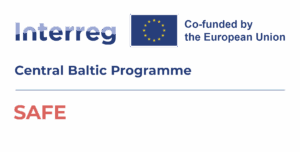SAFE Project Partners Gear Up for Pilot Phase with Health Care Organizations
“Reimagining ageing cannot be achieved by the health sector alone. A fulfilling working life is a key determinant, supporting not only financial security but also physical and mental well-being, social participation, and a sense of purpose in later years. Our cooperation aims to foster a cultural shift towards inclusivity, enhance employment opportunities for older persons, and promote age-friendly workplaces that value intergenerational solidarity”, highlighted Dr. Ülla-Karin Nurm, Director of the NDPHS Secretariat at the 75th session of the WHO Regional Committee for Europe.
 Active and healthy ageing is an ongoing priority area of the NDPHS, and the Interreg Central Baltic-funded SAFE project is one of the ways we aim to redefine ageing and challenge ageism, particularly at the workplaces where we spend so much of our time. During the first meeting with the piloting organizations, the NDPHS Secretariat introduced the participants with the SAFE project’s aims, structure, and the purpose of the piloting. The piloting phase is designed to test and refine tools and methods that help organisations assess and improve their age-friendliness, ensuring that employees of all generations can contribute, develop, and thrive at work.
Active and healthy ageing is an ongoing priority area of the NDPHS, and the Interreg Central Baltic-funded SAFE project is one of the ways we aim to redefine ageing and challenge ageism, particularly at the workplaces where we spend so much of our time. During the first meeting with the piloting organizations, the NDPHS Secretariat introduced the participants with the SAFE project’s aims, structure, and the purpose of the piloting. The piloting phase is designed to test and refine tools and methods that help organisations assess and improve their age-friendliness, ensuring that employees of all generations can contribute, develop, and thrive at work.
During the meeting, Tiina Tambaum, a lecturer from Tallinn University Haapsalu College, highlighted the challenges of an ageing workforce, noting that more than one-third of employees in the social and healthcare sectors are aged 55 or older. She emphasised the importance of combating ageism, fostering intergenerational understanding, and adapting workplaces to the physical, cognitive, and social changes that occur with normal ageing. An age-friendly organisation, she explained, is defined by inclusive management, equality and fairness, flexible working arrangements, health and wellbeing support, and opportunities for continuous learning and redeployment.
Liisa Nuutinen and Heini Maisala-McDonnell from Metropolia University of Applied Sciences spoke about the motivation behind the SAFE piloting process, which is based on Self-Determination Theory. This psychological framework identifies three key needs—autonomy, competence, and relatedness—that enhance intrinsic motivation and well-being when fulfilled. They explained that pilot organisations receive tailored, research-based feedback and concrete recommendations to improve age-friendliness and intergenerational cooperation. The process also supports leaders and HR professionals in strengthening workplace culture, employee retention, and employer reputation, helping them become pioneers in age-friendly employment.
In addition, Tiina Alasoo from Tallinn University Haapsalu College and Patrik Pesonen from Metropolia University of Applied Sciences introduced the initial version of the employee questionnaire, designed to evaluate age-friendliness in organisations, and demonstrated how the tool functions in practice. They also presented the first visual concept of the digital design, giving participants an early look at how the SAFE model will be implemented and used across pilot sites.
The piloting phase takes place from January to April, with flexibility for each participating organisation to begin at the most suitable time according to their internal schedule and readiness. This adaptive approach ensures that every organisation can fully benefit from the process and apply the findings in a way that best supports their employees and workplace culture.
The “Solutions for Age-Friendly Employer (SAFE)” project joins four partners from Estonia, Finland, and Sweden. The cooperation aims to strengthen and improve employment opportunities for senior workers aged 55+ specifically focusing on the health and wellness sectors. The project is financed by the European Regional Development Fund through Interreg Central Baltic 2021-2027.
Project partners:
